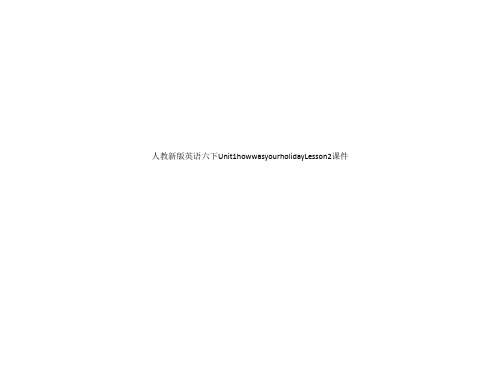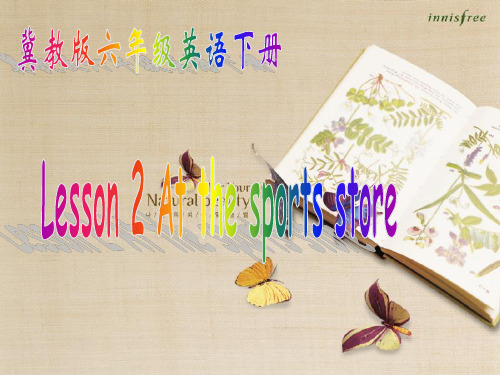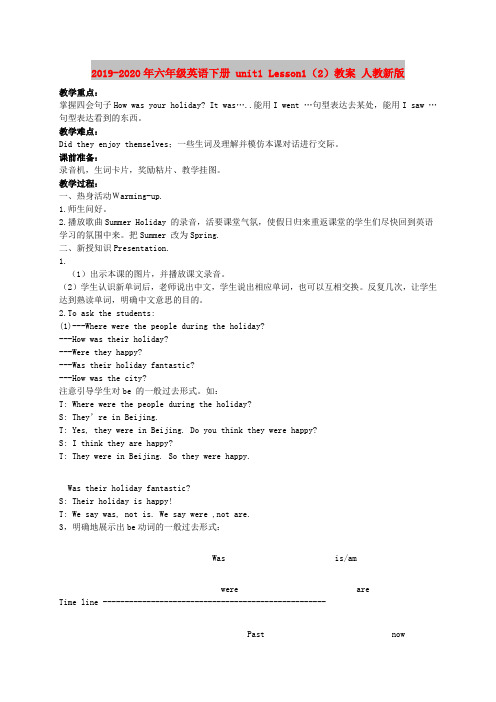最新-六年级英语下册 Unit1 lesson2 How was your holidayLesson教案 人教新版 精品
- 格式:doc
- 大小:22.51 KB
- 文档页数:3

新⼈教PEP六年级英语下册《Unit1_知识详解》Unit1 知识详解A Let’s talk 知识详解重难点1. 如何⽤形容词的最⾼级来描述事物课⽂应⽤:That’s the tallest dinosaur in this hall. 那是这个厅⾥最⾼的恐龙。
亲爱的同学们,你们班⾥⼀定有个⼦“最⾼”的同学吧?也⼀定有学习“最好”的同学吧?这⾥的“最⾼”“最好”怎么表达呢?这时我们就⽤到了形容词的最⾼级,让我们⼀起来学习⼀下吧!形容词的最⾼级⽤于三者或三者以上的⼈或事物进⾏⽐较,具体⽤法如下:三者或三者以上⽐较,表⽰“之最”时,常⽤“the + 形容词最⾼级”的结构表⽰,后跟表⽰⽐较范围的介词短语。
例如:Lucy is the shortest of the three. 露西是三个⼈中最矮的。
形容词的最⾼级前⾯如果有much, by far, nearly, almost等词语修饰,这些词语应放在定冠词the的前⾯。
例如:She is by far the best of all the students in the class. 她是班⾥所有学⽣中最好的(学⽣)。
表⽰“之最”的形容词,如excellent, perfect等,没有最⾼级,也没有⽐较级。
作状语的副词的最⾼级前不加定冠词the。
例如:Of all the boys, he runs fastest. 所有男孩中,他跑得最快。
2. ⼤家⼀起“⽐⼀⽐”课⽂应⽤:It’s taller than both of us together. 它⽐我们俩加起来还⾼。
句型结构:A + be动词+ 形容词⽐较级(taller, stronger …)+ than + B.重点解析:此句型主要⽤于两者进⾏⽐较,课⽂句⼦中的taller是形容词的⽐较级形式。
当我们需要对事物进⾏⽐较时,就会⽤到⽐较级。
形容词的⽐较级是在形容词原形(即原级)的基础上变化⽽来的。


六年级英语下册Unit 1 How was your holiday?(一)单词:Lesson 1- Lesson 21. was[wɔz;弱wəz]是(is,am的过去式)2. holiday ['hɔlədi]假日;节日3. diary ['daiəri]日记4. fantastic[fæn'tæstik]奇异的;极好的;了不起的5. city ['siti]城市6. back[bæk] n. 背部;后面adv. 向后地adj. 后面的7. coconut['kəukənʌt]椰子8. spend [spend]花费(过去式为spent)9. eve [i:v]前夜;前夕10. programme['prəuɡræm]程序;节目;计划,规划11. exciting[ik'saitiŋ]使人激动的,令人兴奋的12. delicious [di'liʃəs]美味的13. wonderful['wʌndəful]令人惊奇的;奇妙的14. were[wə:]是(are的过去式)15. during ['djuəriŋ]在……期间16. travel ['trævəl]旅行;长途旅行17.enjoy [in'dʒɔi]喜爱;享有;欣赏18.interesting ['intristiŋ]有趣的;引起兴趣的19.to [强tu:, 弱tu]到… , 往… , 向…20.eat [i:t]吃(过去式为ate)Lesson 3- Lesson41.yesterday ['jestədi]昨天;在昨天2.bookshop ['bukʃɔp]书店(英国英语)bookstore['bukstɔ:]书店(美国英语)st [lɑ:st]最后的;最近;最后来的人或发生的事情;持续4.shop [ʃɔp]商店;在商店购物5.interested ['intristid]感兴趣的6.movie ['mu:vi]电影(近义词:film)7.little ['litl]一点儿;稍许8.cartoon [kɑ:'tu:n]卡通片;动画片[kɔ:l]打电话叫… ; 称呼;把…叫做10.about [ə'baut]大约,左右;关于,对于11. museum[mju:'ziəm]博物馆[həum]在家;到家13.time [taim]时间(不可数名词);次数(可数名词);倍数(可数名词)14.buy [bai]买(过去式为bought)Lesson 5- Lesson61.born [bɔ:n]出生;天生(在某方面才能)的2.when[hwen]在那时;何时;当……时3.age [eidʒ]年龄4.date [deit]日期;日子;约会;约见5.birth [bə:θ]出生;诞生;分娩6.place [pleis]地点;位置;场所;区域;席位;名词7.same [seim]同样的;同一的;相同的[æz]conj. 因为;依照;当…时;随着;虽然prep. 当作;以…的身份;如同adv. 同样地;和…一样的9.ill [il]有病的;不健康的同义词:sick 比较级:worse 最高级:worst10.Einstein 爱因斯坦(Albert Einstein)11.Andersen 安徒生(Hans Christian Anderson,丹麦的童话作家)['ɡrændmɑ:]奶奶;外婆['fiziks]物理学['esei]散文;随笔Revision( Unit One )1.library ['laibrəri]图书馆;藏书楼2.spot[spɔt]点;斑点;看见(到);注意到;辨认;发现[dʒim]体育馆4.over ['əuvə]结束;在…上方(面)(指垂直的上方)5.toilet ['tɔilit]厕所;卫生间6.angry ['æŋɡri]生气的;发怒的7.care [kεə]小心;谨慎;关心;照顾8.suddenly['sʌdnl i]突然地六年级英语下册Unit 1 How was your holiday?(二)词组:Lesson 1- Lesson 21. come back to 返回2. enjoy oneself=have a good time = have fun 过得愉快3. many banana trees 许多香蕉树4. go there 去那儿5. in summer 在夏季6. on the eve of the Spring Festival 在春节前夜7. that night 那天晚上8. during your holiday 在你的假期期间9. in Shanghai ( Kunming) 在上海(昆明)Lesson 3- Lesson41. at home 在家;在国内be at home in 精通;熟悉2.at the bookshop在书店3.at the shop 在商店4.at the cinema 在电影院5.a lot of new books 许多新书6.a book of cartoon 一本卡通书7.see a movie 看电影8. a little late 有点儿晚9.be interested in doing sth.对做某事感兴趣10.enjoy doing sth.喜爱做某事st Sunday上周日12.at that time在那时13.in the playground ( gym )在操场上(体育馆)14.go to bed 上床睡觉;go to the bed 向床走去Lesson 5- Lesson61.on the same day as you与你在同一天2.on New Year’s Day在新年3.on January 1st,1992 在1992年1月1日st week 上周5.date of birth=birthdate出生日期6. place of birth =birthplace出生地7.study physics 研究物理学8.write stories for children为孩子们写故事9.write essays for the Chinese people为中国人写文章10.write books for children为孩子们写书11.cry to me 向我哭泣Revision( Unit One )1.take care of 照顾;负责2.spot something 发现了一些东西3.get home 到家4.this morning (afternoon )今天早上(下午)5.in the library 在图书馆6.be angry with sb. 对…生气六年级英语下册Unit 1 How was your holiday? (三)句型:Lesson 11.School begins. The sudents come back to school.开学了。

六年级下册英语第1课第2课作文English:In the second lesson of the 1st unit in the 6th grade English textbook, we learned about describing people's physical appearance. We practiced using adjectives to describe different features such as hair color, height, and weight. We also learned about using the verb "to be" to describe someone's age and nationality. In addition, we learned about asking and answering questions about physical appearance using the phrase "What does he/she look like?" and "He/She looks...". This lesson was helpful in expanding our vocabulary and improving our ability to describe people in English.中文翻译:在六年级英语课本的第一单元的第二课中,我们学习了描述人的外貌。
我们练习使用形容词来描述不同的特征,比如头发颜色、身高和体重。
我们还学习了用动词“to be”来描述某人的年龄和国籍。
此外,我们学习了如何使用短语“他/她长什么样?”和“他/她看起来…”来提问和回答关于外貌的问题。
这节课对拓展我们的词汇量和提高我们用英语描述人的能力有很大帮助。


2019-2020年六年级英语下册 unit1 Lesson1(2)教案人教新版教学重点:掌握四会句子How was your holiday? It was…..能用I went …句型表达去某处,能用I saw …句型表达看到的东西。
教学难点:Did they enjoy themselves;一些生词及理解并模仿本课对话进行交际。
课前准备:录音机,生词卡片,奖励粘片、教学挂图。
教学过程:一、热身活动Warming-up.1.师生问好。
2.播放歌曲Summer Holiday 的录音,活要课堂气氛,使假日归来重返课堂的学生们尽快回到英语学习的氛围中来。
把Summer 改为Spring.二、新授知识Presentation.1.(1)出示本课的图片,并播放课文录音。
(2)学生认识新单词后,老师说出中文,学生说出相应单词,也可以互相交换。
反复几次,让学生达到熟读单词,明确中文意思的目的。
2.To ask the students:(1)---Where were the people during the holiday?---How was their holiday?---Were they happy?---Was their holiday fantastic?---How was the city?注意引导学生对be 的一般过去形式。
如:T: Where were the people during the holiday?S: They’re in Beijing.T: Yes, they were in Beijing. Do you think they were happy?S: I think they are happy?T: They were in Beijing. So they were happy.Was their holiday fantastic?S: Their holiday is happy!T: We say was, not is. We say were ,not are.3,明确地展示出be动词的一般过去形式:Was is/amwere areTime line ---------------------------------------------------Past now4.播放录音磁带,并且展示间笔画,以帮助学生理解对话内容。
Unit 1 How was your holiday?Lesson 2 一、教学目标
知识目标:
To learn the past tense of be.
To learn new words and sentence pattern.
To practice pronunciation by chant.
能力目标:
To ask the students to inquire or introduce one’s holiday.
德育目标;
1. To arose the students interest of English learning.
2. To teach them to love our motherland.
二、教学重点:
How was your holiday?
It was wonderful /exciting.
Where were you during your holiday?
I was at home.
三、教学难点:即教学重点。
四、课前准备
Word cards.
A song: Today & Yesterday.
To prepare some pictures of different cities.
五、教学过程
I. Greeting.
II. Warming-up
1. Sing a song “Today & Yesterday”.
2. Free talk.
3. To review some words:
interesting, fantastic, exciting
III. Presentation.
1. To teach them the new words: wonderful, exciting.
2. To have a competition: Who can read it faster?
(interesting, fantastic, exciting, wonderful)
3. To learn the new sentence pattern:
How was your holiday?
It was wonderful.
Where were you during your holiday?
I was at home.
IV. Practice
1. To look at the words and pictures on the screen and ask the students to practice the new sentence pattern.
2. Chant.
3. To make up new dialogues according to the new sentence pattern (with their own photos or the pictures).
4. Time to sing. (Happy song) V. Summary
六、教学意图
I. Greeting.
II. Warming-up
1. To review the words: was, were.
2. To review the knowledge they’ve learned before.
III. Presentation.
1. To teach them the new words.
2. The students master the new words.
3. To learn the new sentence pattern.
IV. Practice
1. To master the new words and sentence pattern.
2. To practice pronunciation.
3. The students can use the new sentence pattern and new words freely by making up new dialogues.
V. Summary
七、作业
1. To write the new words and sentences.
2. To make up new dialogues according to the new sentence pattern.
板书设计:
Lesson
2
How was your holiday?
It was wonderful /exciting.
Where were you during your holiday?
I was at home.。